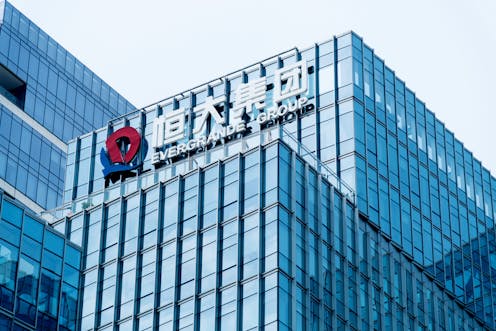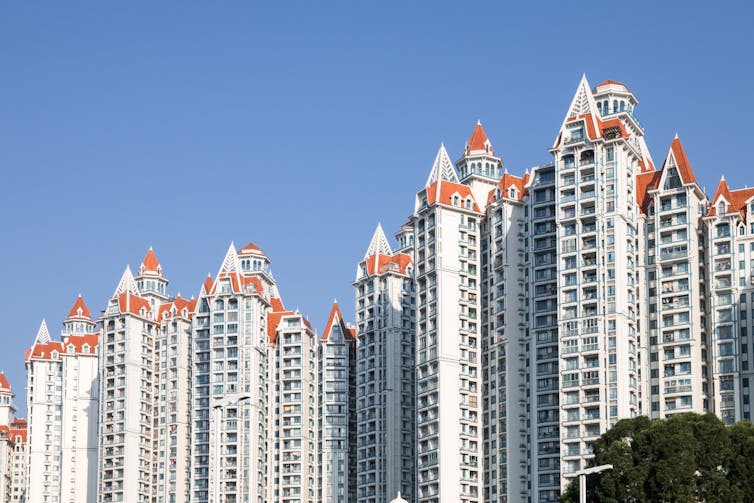China's problem with property: the domino effect of Evergrande's huge debts
- Written by Qing Wang, Professor of Marketing and Innovation, Director, Marketing Innovation and The Chinese and Emerging Economies (MICEE) Network, Warwick Business School, Warwick Business School, University of Warwick
 shutterstock
shutterstockThe Chinese property giant Evergrande is suffering under an enormous pile of debt, reportedly worth US$305 billion (£220 billion). There have been angry protests at its headquarters, shares have tumbled, and the eyes of the financial world remain anxiously focused on its future.
Put simply, the situation at Evergrande is dire. And the potential impact of its troubles reaches far beyond the company itself, with devastating consequences for individual home owners in China, businesses and the global economy.
The big question is whether Evergrande will go bankrupt. The company has fiercely denied the prospect and insists it will find a way out of trouble. But some industry experts predict the most likely scenario is that the company will eventually seek bankruptcy. Reports suggest that a state-owned investment company has been lined up to manage Evergrande’s assets.
From the Chinese government’s perspective, the aim will be for Evergrande to come to an arrangement to repay its debts, hopefully minimising the impact of its collapse on the financial sector. Those most at risk include the companies it owes, who could go bankrupt, or banks it is in debt to who could lose so much money that they can’t lend to other businesses, which could then go bankrupt.
And since Evergrande borrowed heavily from state-owned banks, this outcome puts significant pressure – and a potential hefty loss – on the shoulders of the Chinese government.
In an attempt to calm nerves, on September 21 the chairman of Evergrande, Xu Jiayin, said the company will pay the annual interest on a debt worth US$600 million. It is hoped this will reassure the company’s employees and send a positive signal to the company’s stakeholders.
So far, such measures seem to have had at least a temporary effect on the stock market, which has seen dramatic falls over the past six months. On September 23, the share price of Evergrande went up, but the next day concerns grew once again after an interest payment was missed.
Knock-on effect
The immediate impact of Evergrande’s troubles will be on China’s once booming property market. The sector represents 7.3% of the country’s GDP compared to 4.1% in 2000. It is a market which been over-expanding for many years, with the debt level of other big development firms already very high. If Evergrande were to collapse, it would cause a domino effect across the sector, potentially leading to the demise of more businesses.
Indeed, the China Chenxin Credit Rating Group (CCXIS) has already downgraded the outlook of China’s property sector to negative. This change makes it even more difficult for those companies to raise funds, exacerbating the debt situation and making borrowing more expensive.
Beyond the world of property, the collapse of Evergrande would have major ramifications in other sectors it is involved with, including consumer electronics, building materials, furniture and electric cars.
 Chinese property has been booming.
Chinese property has been booming.The situation remains fluid, and it is difficult to predict what will happen next. But in the longer term, Evergrande’s future, if it has one, may be more in line with China’s longer-term strategy on making accommodation more accessible to more people.
The Chinese government has said it wants to provide ordinary people with affordable housing, recently reemphasising the philosophy of “common prosperity” and the idea that a house is for living in, not investing in. For this reason, Beijing is keen to dampen the overheated property market and steer overall investment to strategically important sectors including semi-conductors, new energy and pharmaceuticals.
But private companies of any description are likely to be hit by the fall out from Evergrande – a private enterprise which has grown into an economic giant. State-owned enterprises in these strategically important sectors meanwhile are likely to gain greater advantage in terms of trust and resources.
In the immediate future, the Chinese government may have other pressing concerns. If Evergrande goes bankrupt, it will need to engage in the expensive task of protecting tens of millions of home owners and avoiding social unrest.
Qing Wang does not work for, consult, own shares in or receive funding from any company or organisation that would benefit from this article, and has disclosed no relevant affiliations beyond their academic appointment.
Authors: Qing Wang, Professor of Marketing and Innovation, Director, Marketing Innovation and The Chinese and Emerging Economies (MICEE) Network, Warwick Business School, Warwick Business School, University of Warwick
